The third day of this year's Cannes Film Festival was a busy one. First, there were two premieres for films in the main competition, Joachim Trier's The Worst Person in the World and Mahamat-Saleh Haroun's Lingui. The response to the latter was so effusive, some are already calling it a contender for the Palme d'Or. Then, in the Un Certain Regard section, Kogonada's sophomore feature, After Yang, took its bow. Other premieres from prominent directors included Andrea Arnold's Cow and Tom McCarthy's Stillwater. Our Cannes at Home program is made up of past films from this illustrious quintet, encompassing a meditation on loss, an allegory of civil war, love songs for architecture, and more.
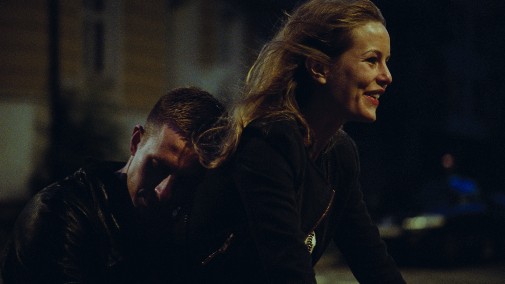
OSLO, AUGUST 31ST (2011)
From dawn to dawn, a young man ponders the end. Joachim Trier gives a premise fit for po-faced European miserabilism a fresh face in Oslo, August 31st. While not treading new ground, the tale of potential death is all about life, approaching the material with a form that rarely overstates the idea with either in-your-face vitality or florid nihilism...
Instead, Trier invites the viewer to walk alongside his protagonist through the Norwegian capital, observing the day go by in a series of difficult conversations and peaceful interludes, quiet cafés and nocturnal rides. Though the tone is gentle, almost romantic at times, the emotional arc is violent, depicting the instant when the fruit of hope rots on the branch, turning into a festering mass of despondence. It's the balance of the camera's silken caress and a slash of spiritual angst. Make no mistakes, Oslo, August 31st is a brutal film, but not because it handles its ideas like whips with which to flog the spectator. On the contrary, it's precisely the opposite. Trier finds devastation in clemency, his cinema ruled by a tenet of empathy. If not, the emptiness of the ending shots wouldn't be nearly as heartbreaking or as curiously life-affirming. In that coda, this city symphony becomes the sentimental child of Antonioni's Eclipse.
Available to rent on Amazon Prime, Google Play, Youtube, and Apple iTunes.
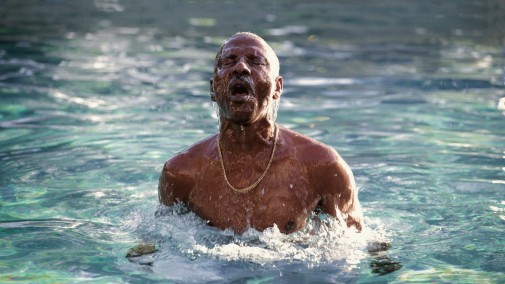
A SCREAMING MAN (2010)
Back at the 63rd Cannes Film Festival, Mahamat-Saleh Haroun's A Screaming Man won the Jury Prize, popularly assumed to be a third-place honor. The film posits the conflict between a father and son as a synecdoche for the Chad's civil war, mixing the personal and political within an unbending allegory. Blunt, sometimes to significant effect, this intergenerational drama starts in serenity, a languid sequence of disconnected scenes establishing familial and professional dynamics. A pool soon emerges as a totemic symbol, ominously presented while morsels of watermelon-flavored domesticity offer contrast. Then, one day, a threat springs forth from the watery depths - a demotion for the patriarch, a promotion for the son. The equilibrium shatters, and the rest is a slow-motion implosion of masculine resentment. After a parade of cruelty, the conclusion returns us to tranquility, placidly floating away in liquid sunset. However, the sense of loss is searing, inescapable, and the recovered peace feels like hot irons against the skin. Carefully framed, A Screaming Man is a jewel of disciplined form and portentous messaging. All in all, an understandable choice for end of the festival plaudits. Let's see if Haroun can repeat such triumph this year. Maybe he can win something bigger.
Streaming on the Criterion Channel, Tubi, Kanopy, and Film Movement Plus. You can also rent it on Amazon Video.
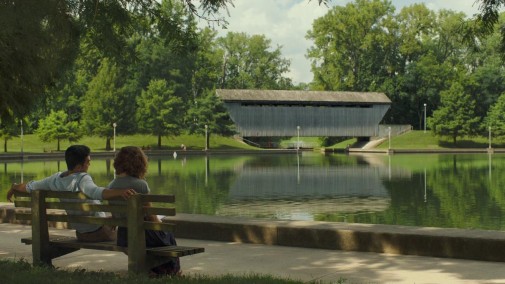
COLUMBUS (2017)
Few experiences are more enlightening than learning to love something by looking at it through another's eyes. To connect with art by sharing in on someone else's adoration, feeling the borrowed impact reverberate deep in the soul. Kogonada's feature debut after a sterling go as an essayist is a sublime sublimation of that phenomenon, a paean to modernist architecture in the city that gives the picture its title. Every frame a painting, Columbus delineates how edifices can shape life, draw the eye, repudiate it, pull us in and out. Through transformations of quotidian sights into bold graphic art, Kogonada weaves a tale of lonely souls as Justin Cho deals with filial grief and Haley Lu Richardson ponders an untethering from the nest. By following them, the film becomes a study in loss, the empty spaces around bodies in search of connection, reassurance, looking for the warmth of a costless embrace. Shot by Elisha Christian and cut by Kogonada himself, Columbus feels like a pas de deux of two lives in which parallel gestures – walking by a fence, looking out at a garden, showering - make for breathtaking cinema.
Streaming on Kanopy, Yupp TV, and Topic. You can also rent it from many services.
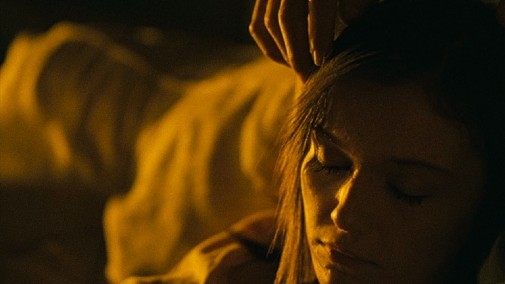
FISH TANK (2009)
Like the title implies, the protagonist of Fish Tank lives inside a box. However, the walls around this teen girl are more immaterial, made of social boundaries and economic anxieties. It's a metaphor rather than a glass cage, though such visuals pop up in the picture's repertoire of insert shots. The simple thesis could result in overbearing filmmaking, but Andrea Arnold knows just what wrinkles to add, what sounds and sights to tweak for the obviousness to be an integral part of Fish Tank's kick. When it hits, it hits hard, bruising the viewer with its view of a young woman bristling at the limits of her existence, her desires, and vulnerability. Sometimes, she even seems to struggle against the boxy frame. While never stepping out of kitchen-sink realism, Arnold's cinema evokes a heightened state of audiovisual expression, formalistically precise even as it seems accidental. That's never more apparent than in her direction of actors. Combining non-professionals with trained thespians isn't easy, but the British auteur makes it seem so. Through young Katie Jarvis' study of adolescence and Michael Fassbender's take on predatory eroticism, Fish Tank takes its place of honor as Andrea Arnold's best and most uncomfortable feature.
Streaming on AMC+, the Criterion Channel, Tubi, DirecTV, and Plex.
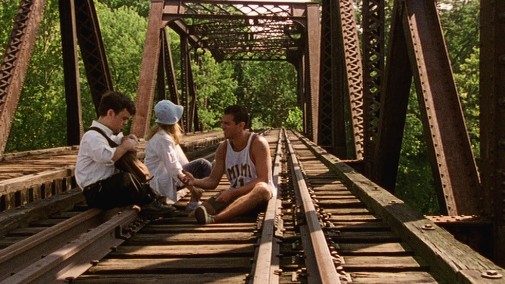
THE STATION AGENT (2003)
Set in rural New Jersey, The Station Agent is about those who run towards solitude but end up crashing into unlikely companionship. The portrait of a grieving man and the friends he finds along the way remains one of the great American indies about loneliness. It's a treasure trove of great acting too. While Patricia Clarkson received her sole Oscar nomination in 2003, it was for the wrong film. The Station Agent showcases the actress at her best, finding delicate connective tissues between wisdom and weariness, playing understated naturalism as a weapon with which to stab the audience when they least expect. In the lead role, Peter Dinklage delivers the best performance of his career while Bobby Cannavale's supporting turn finds him adapting his usual bluster to a quiet milieu. Michelle Williams surprises in a limited part, as do John Slattery, Lynn Cohen, and many others. The picture's a treasure trove hiding beneath a blanket of melancholia. While not nearly as acclaimed as the Best Picture-winning Spotlight, The Station Agent's arguably Tom McCarthy's best directorial effort, an unmissable humanistic gem.
Available to rent from many services, including Amazon and Youtube.
Do you love any of these directors? If so, what film made you a fan?